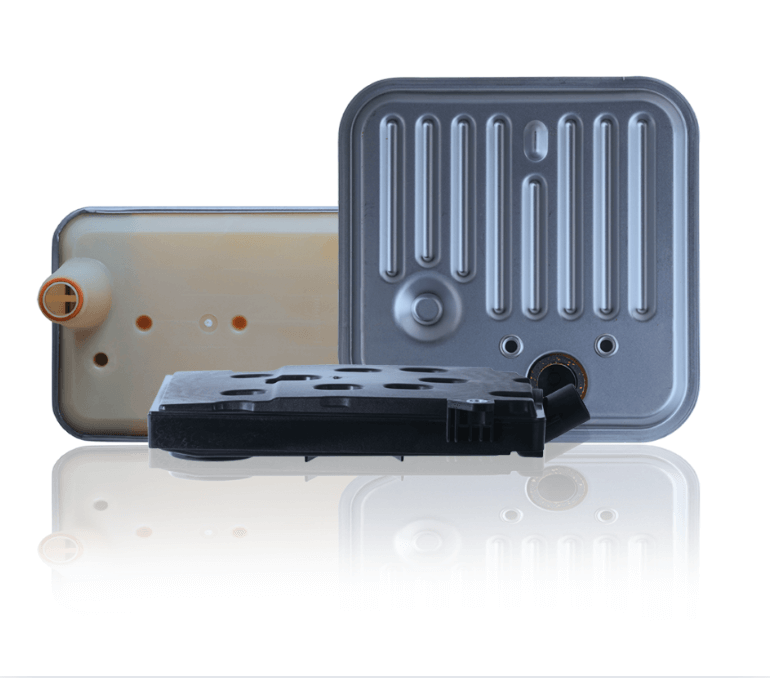When it comes to maintaining your vehicle’s transmission, one of the most important components is the transmission filter. This small but essential part helps keep transmission fluid clean, ensures smooth shifting and prevents costly repairs. However, when it comes time to replace your transmission filter, you may be faced with a choice: aftermarket or OEM (original equipment manufacturer).
We’ll walk you through the differences between these two options, which will help you decide which one is best for your vehicle and budget.

What is transmission filter?
Before comparing, take a moment to understand what transmission filters do. The primary function of a transmission filter is to trap debris, metal shavings and other contaminants from the transmission fluid. By doing so, it helps maintain fluid cleanliness and protects transmission components from wear and tear. A clean filter is essential for optimal transmission performance and longevity.
What is an OEM transmission filter?
OEM transmission filters are manufactured by the vehicle’s original manufacturer or a licensed supplier. These filters are specially created for your vehicle model, ensuring a perfect fit and compatibility.
Some of the features of OEM filters are:
Precision engineering: OEM filters are manufactured to the manufacturer’s exact specifications, ensuring they meet all performance standards.
Quality assurance: OEM filters go through a rigorous testing and quality control process, which often means they are more reliable than aftermarket options.
Warranty: Many OEM filters come with warranties, giving you peace of mind about their performance.
Advantages and Disadvantages of OEM Transmission Filters
Benefits:
Perfect fit for your car
High quality materials and construction
Guaranteed reliability and performance
Disadvantages:
Generally more expensive than aftermarket alternatives
Limited availability, as they may have to be ordered through dealerships
What is an aftermarket transmission filter?
Aftermarket transmission filters are produced by third-party manufacturers and are not directly associated with the vehicle’s original manufacturer. They often aim to provide more affordable alternatives to OEM filters.
Features of aftermarket filters are:
Variety of options: Aftermarket filters come in a wide range of brands and designs, giving consumers more choice.
Cost-Effective: Generally, aftermarket filters are less expensive than OEM filters, making them an attractive option for budget-conscious consumers.
Variation in performance: Some aftermarket filters are created for higher performance, offering features that may exceed OEM specifications.
Advantages and disadvantages of aftermarket transmission filters
Benefits:
More affordable than OEM filters
Wide selection of brands and features
Some high-performance options are available
Disadvantages:
Different brands vary in quality and reliability
Potential compatibility issues if not properly researched
May not offer the same level of warranty as OEM alternatives
Cost Comparison: OEM vs. Aftermarket Transmission Filters
OEM Transmission Filters: Prices typically range from $50 to $150 depending on the make and model of your vehicle. Although the initial investment can be high, OEM filters often provide good long-term value due to their reliability.
Aftermarket Transmission Filters: Aftermarket filters can range from $20 to $100 or more depending on brand and features. While they are generally more budget-friendly, quality and performance can vary widely, which can lead to additional costs down the line if a cheap filter fails.

Which Transmission Filters Are Right For You?
It’s something many of us think, but the answer is that choosing between an OEM and an aftermarket transmission filter depends on a number of factors, including your vehicle, budget and driving habits.
To make your decision easier and easier, here are some things to consider:
Type and use of vehicles
If you use your car for daily commuting and general driving, an aftermarket filter may be a good choice, especially if it comes from a reputable brand.
And if you own a high-performance or modified vehicle, investing in an OEM filter or a high-quality aftermarket option created specifically for performance may be the best way to ensure optimal performance.
Budget constraints
If you’re on a tight budget, aftermarket filters can provide a more cost-effective solution without sacrificing much performance, provided you choose a reputable brand.
However, if you can afford the higher initial cost, OEM filters can give you peace of mind with their proven reliability.
Maintenance history
If your vehicle has a history of transmission problems, it may be wise to stick with OEM filters to ensure compatibility and reliability. And I honestly recommend it.
If your vehicle is well maintained, a high-quality aftermarket filter may be sufficient. But it is your personal matter
How often should I change my transmission filter?
The frequency of transmission filter changes varies depending on your vehicle’s make, model, and your driving habits.
The standard recommendation is that most car manufacturers recommend changing the transmission filter every 30,000 to 50,000 miles. This helps keep the transmission fluid clean, allows it to flow smoothly, and protects the transmission from wear.
And heavy-duty or severe conditions if you frequently drive in conditions that put extra stress on your vehicle, such as:
Pulling or hauling heavy loads
Frequent stop and go traffic
Driving in extreme heat or cold
In this case, you may need to change the filter more frequently, every 20,000 to 30,000 miles, to prevent contamination and overheating.
Conclusion
When it comes to choosing between aftermarket and OEM transmission filters, there is no one-size-fits-all answer. Each option has its own advantages and disadvantages, and the best choice for you will depend on your specific vehicle, budget and driving needs.
Ultimately, your decision should be based on thorough research and understanding of your vehicle’s needs. By maintaining a clean and efficient transmission filter, you will help ensure the longevity and performance of your vehicle for years to come.
